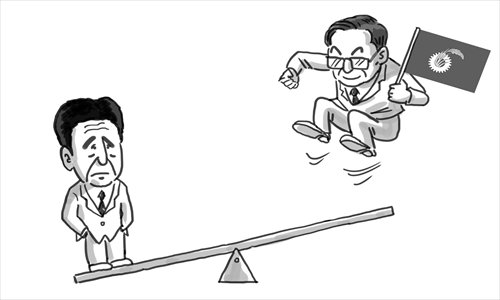HOME >> OP-ED
LDP challenged by rising communist party
By Huang Wenwei Source:Global Times Published: 2014-12-11 22:23:01

Illustration: Liu Rui/GT
As the lower house election called by Japanese Prime Minister Shinzo Abe is to be held on Sunday, both the ruling and opposition parties have been passionately wooing voters. Amid the fierce run-up, the Japanese Communist Party (JCP) that was established in 1922 but has previously not been prominent in the political arena, stood out among enfeebled opposition.
In light of the audiences and their responses to candidates' street speeches, a useful approach to gauging support, the only candidate to stand up against Abe seems to be Kazuo Shii, the JCP chairman.
On Tuesday, over 1,000 people attended Shii's speech in Nagano Prefecture despite chilly winds. The region has two JCP candidates for the snap election, aged 44 and 35. Shii's speech in the port city of Yokohama was attended by about 3,500 people and responded to enthusiastically.
In comparison, former prime minister Naoto Kan of the largest opposition party, the Democratic Party of Japan, hardly attracted any passers-by during his talks.
In the upcoming election, JCP has 315 candidates to compete with 352 from the ruling Liberal Democratic Party (LDP). Although the latest Kyodo News poll shows that the coalition of the LDP and Komeito is expected to win more than two thirds of the lower house seats, it's undeniable that the JCP's clear stance in opposition to Abe's policies is gaining recognition from the public.
Specifically, the JCP pledges to repeal the planned consumption tax hike to 10 percent, which was postponed by Abe until April 2017, and withdraw from the US-led Trans-Pacific Partnership negotiations.
While the Abe administration has endeavored to restart Japan's nuclear reactors idled after the devastating Fukushima disaster in 2011, the JCP advocates a nuclear-free nation that most Japanese want.
On other controversial issues, the JCP opposes the relocation of the US Futenma air base to Nago in the Henoko coastal district and pledges no dispatch of Japan's self-defense forces on overseas military missions.
The JCP also calls for Abe to revoke his decision on allowing Japan to exercise the right to collective self-defense and to build Japan's diplomacy as well as a peaceful life for the people in accordance with the Article 9 of the war-renouncing Peace Constitution.
With explicit targets set out by the JCP on the public's concerns, on social networking services many voiced their plan to vote for the party as it appears to take the election more seriously than other opposition parties and has boldly challenged the LDP in many constituencies.
Many believe that members of other opposition parties put more focus on their own interests and don't deserve the public's trust on managing national affairs.
Moreover, despite continuous public protest, a new state secrecy law took effect on Wednesday as part of Abe's attempt to revise the Constitution.
Many people are worried that Japan may go along a dangerous path of possibly taking part in wars and a preference for the JCP may pull back society from the brink.
As the JCP advocates more opportunities and better welfare for the young, an increasing number of young people now have a more favorable impression of the party. In December last year, about 2,000 young people joined the party. The number rose to 5,100 in the period between May and July, with 3,000 simply in July when the cabinet decided to allow Japan to exercise the right to collective self-defense, and 30 percent of them are under 39 years old.
It has been suggested that the JCP will attract even more members if it changes the name since the term "communist" has largely negative connotations in Japan.
The JCP hasn't gained its popularity suddenly. In 2008, Kanikosen, in English as The Cannery Boat, a novel written by Japanese author and later JCP member Takiji Kobayashi in 1929 became a surprise bestseller as its descriptions of the miserable life of the poor almost 100 years ago resonated with young people today. Against the background of economic gloom and public disappointment, the JCP is striving to challenge the ruling party as advocated by Kobayashi in the novel.
The author is a columnist based in Tokyo. opinion@globaltimes.com.cn
Posted in: Viewpoint